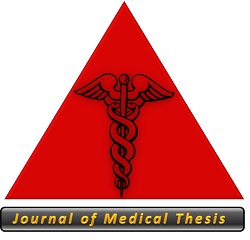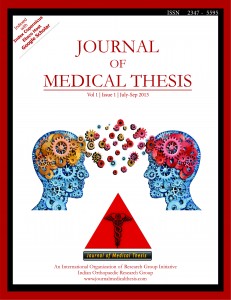Tag Archives: Research
The Importance of Thesis in the Postgraduate Curriculum
Vol 11 | Issue 1 | January-June 2025 | page: 1-2 | Sachin Kale, Arvind Vatkar, Ashok Shyam, Ojasv Gehlot
https://doi.org/10.13107/jmt.2025.v11.i01.230
Author: Sachin Kale [1], Arvind Vatkar [2], Ashok Shyam [3], Ojasv Gehlot [1]
[1] Department of Orthopaedics, D Y Patil Hospital, Navi Mumbai, Maharashtra, India.
[2] Department of Orthopaedics, MGM Medical College, Navi Mumbai, Maharashtra, India.
[3] Department of Orthopaedics, Sancheti Institute for Orthopaedics and Rehabilitation, Pune, Maharashtra, India.
Address of Correspondence
Dr. Sachin Kale,
Department of Orthopaedics, D Y Patil Hospital, Navi Mumbai, Maharashtra, India.
E-mail:sachinkale@gmail.com
Abstract
The postgraduate thesis is an essential academic milestone that plays a pivotal role in shaping the intellectual, clinical, and professional development of students. Beyond being a mandatory requirement for degree completion, the thesis fosters critical thinking, encourages evidence-based practice, and provides exposure to research methodology. It also helps cultivate skills in scientific writing, data interpretation, and subject expertise. This article explores the multifaceted importance of the thesis in the postgraduate curriculum, emphasizing its role in academic growth, professional preparedness, and contribution to scientific knowledge. By integrating research training into postgraduate education, institutions ensure the development of well-rounded, competent, and research-oriented professionals.
Introduction:
Postgraduate education marks a crucial transition from a knowledge-receiving phase to one of knowledge creation and application. One of the core components of this academic transformation is the postgraduate thesis—a structured research project that is both a learning process and a contribution to science. Though often seen as a formal requirement, its significance extends far beyond submission and evaluation. The thesis is a vital tool in honing a student’s ability to think critically, analyze data, explore clinical or theoretical questions, and present evidence in a structured and scholarly manner.
________________________________________
1. Foundation of Research-Oriented Thinking
A well-designed thesis project introduces postgraduate students to research methodology, including study design, literature review, data collection, ethical compliance, statistical analysis, and interpretation. It marks their first exposure to structured research, setting the stage for future scientific inquiry. In doing so, the thesis helps inculcate a habit of research-oriented and analytical thinking—skills that are indispensable in both academic and clinical practice.
________________________________________
2. Enhancing Critical Thinking and Decision-Making
The thesis encourages students to critically analyze existing literature, identify gaps in knowledge, and formulate research questions. This process promotes critical thinking and refines decision-making capabilities, both of which are necessary for evidence-based practice. Whether in medicine, engineering, social sciences, or management, the ability to evaluate information objectively is central to professional success.
________________________________________
3. Promoting Evidence-Based Practice
In clinical fields, especially in medicine, nursing, and allied health sciences, the thesis nurtures the spirit of evidence-based practice. By reviewing contemporary literature and generating new data, students gain insight into the most effective and scientifically validated approaches to patient care. This alignment between research and practice enhances clinical outcomes and encourages life-long learning.
________________________________________
4. Strengthening Subject Expertise
The process of working on a thesis enables students to delve deep into a specific topic, transforming them into subject matter experts in that niche. This depth of knowledge not only boosts their confidence but also enhances their academic profile and makes them more competitive for fellowships, higher studies, and academic positions.
________________________________________
5. Development of Scientific Communication Skills
The thesis teaches students how to write scientifically, present data logically, and maintain academic integrity. These skills are crucial for publishing research papers, presenting at conferences, and applying for research grants. Good communication of ideas, supported by evidence, is a skill valued across all professional domains.
________________________________________
6. Cultivating Innovation and Original Thinking
The thesis is often a student's first venture into creating original knowledge, encouraging innovation and creativity. Whether it leads to a novel surgical technique, a new approach to management, or a unique theoretical framework, the process fosters a culture of discovery and progress.
________________________________________
7. Academic Recognition and Career Advancement
A well-researched thesis can lead to presentations at conferences, publications in indexed journals, and recognition by peers and mentors. These achievements significantly strengthen the student’s academic and professional credentials. For those aspiring to pursue a PhD or academic career, the thesis serves as the first building block of their research portfolio.
________________________________________
8. Contribution to National and Global Scientific Literature
Each thesis adds to the existing body of knowledge. In countries where research output is relatively low, postgraduate theses can contribute meaningfully to national health or development policies. By publishing their thesis findings, students help fill gaps in regional data, foster innovation, and influence global research trends.
________________________________________
9. Personal and Professional Growth
Completing a thesis project enhances skills such as time management, perseverance, resilience, and problem-solving. Students learn to work under deadlines, collaborate with peers and mentors, and adapt to challenges—preparing them not only for research but for the dynamic demands of professional life.
________________________________________
10. Institutional and National Impact
Institutions that actively promote high-quality thesis research often witness improvements in their academic reputation, rankings, and research output. At a broader level, national development in fields like health, education, technology, and policy is driven by research, much of which originates at the postgraduate level.
________________________________________
Conclusion
The thesis is far more than a rite of passage in postgraduate education—it is a platform for transformation. It empowers students to become thinkers, researchers, and leaders in their fields. By embedding research training into the postgraduate curriculum, academic institutions ensure the emergence of knowledge creators rather than mere knowledge consumers. Encouraging students to take their thesis seriously not only elevates their academic journey but also enriches the scientific community and society at large
| How to Cite this Article: Kale S, Vatkar A, Shyam A, Gehlot O|The Importance of Thesis in the Postgraduate Curriculum | Journal of Medical Thesis | 2025 January-June; 11(1): 01-02. |
Full Text HTML | Full Text PDF




